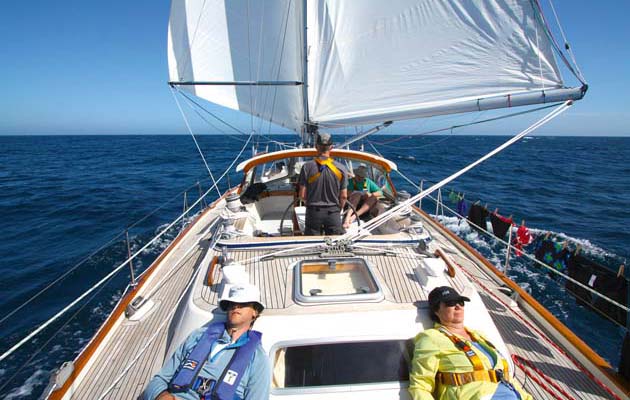There is no place to escape when crew members turn on each other. Terysa Vanderloo describes two voyages from hell with tips on how to avoid bad blood.
Boat crews fall apart – it happens from time to time – but in Rodney Bay, St Lucia, at the end of the annual Atlantic Rally for Cruisers (ARC), the high concentration of newly demobilised ocean sailing crew offers rich pickings for such stories to be told and heard. Most crews leave having formed lifelong friendships, but inevitably for some there will have been character clashes on board.
An ocean crossing can be exhilarating and exciting but sleep deprivation, stress, seasickness, and lack of personal space can shorten the temper of even the most mild-mannered person. A bad atmosphere on board is like a powder keg – it only takes a tiny spark to set it off.
My partner and I were lucky enough to have an enjoyable Atlantic crossing last year, but there were several boats that weren’t so lucky.
One couple, who we’ll call ‘Jay’ and ‘Kay’, bought their yacht a year before the ARC, with the intention of spending a season or two cruising the Caribbean. It was their dream, the result of years of hard work and planning.
Aware of their own relative lack of experience, they chose their crew carefully: three men and one woman, each of whom had their own specific skill set. What they didn’t take into account was their temperament and attitude.
“There is so much to buy and do: the safety equipment and the sailing gear, the rigging, the food, the spares and sails,” says Kay. “But of all the preparation we did, we certainly didn’t include enough thinking about crew selection and crew dynamics.
“I’m not saying we didn’t think about it, we did. But you cannot know the issues that will arise when six strong intelligent adults are forced to live together on a boat.”
Jay and Kay had sailed with each crew member before the crossing. One in particular had shown negative behaviour during his trial passage, but Jay and Kay had hoped it was an anomaly. They couldn’t have been more wrong.
They recall that pre-passage nerves were a factor. “We had one person crying on the morning we set off because the galley was a mess and not everything was stowed.It took five minutes to tidy, but this caused a lot of stress for that individual.”
Once under way, the atmosphere only got worse.

Terysa Vanderloo
“A blame culture set in. There were accusations of all kinds from lack of effort to poor skills or poor decision making.”
The yacht – a modern production design – was the subject of much criticism.
“If any equipment broke due to human error, it was blamed on the yacht being badly designed or the equipment being of poor quality. We were told how disappointing the preparation of the boat had been.
“The frustrating thing was that we involved all of the crew in the preparation over the previous year. We even gave them free rein in Las Palmas to inspect the boat, spares and equipment and buy whatever parts or items that they felt were missing,” recalls Kay.
Tensions came to a head when the crew found a grapefruit-sized hole in the main sail. They unearthed the sail repair kit but with only spinnaker repair tape on board, a heated argument ensued between Jay and one crew member about how to repair the sail.
Kay explains, “He said, ‘It won’t last, the hole will get bigger and rip the main. We should go to the Cape Verdes to fix it.’
“He went on to criticise Jay’s poor leadership skills, saying: ‘The skipper hasn’t made a decision the whole journey.’ Jay made the decision to continue to Saint Lucia. Guess what – the repair lasted all the way.”
After 16 days at sea, they finally crossed the finish line. For most yachts in the ARC, this is a definitive highlight. Not for Jay and Kay.
“For us, this was the lowest point. The two of us were excited – look what we had done together!
“I suggested that we all change into our crew T-shirts for a finishing line photo and celebrate. The answer was no. We arrived as we had left: under a thick cloud of moodiness.”


Modern day mutiny
Crew can also have an unpleasant crossing if joining an unwelcoming skipper. ‘Jo’ and ‘Alex’ had a negative experience crewing on a catamaran that belonged to a liveaboard couple.
Alex says: “We had been searching for a boat to do the ARC on for a few months using Crewbay and Ocean Crewlink websites. As long as the boat was sound and the owners seemed okay, we would be happy to join them.
“Early on, everything seemed fine: we were all very relaxed, shared costs without any fuss, got on well and all chipped in with the different jobs on the boat.”
However, on the passage from Gibraltar to the Canaries, the atmosphere deteriorated.
There was an opportunity for anyone to leave the boat in the Canaries, but all were understandably reluctant. Of the four crew, only Alex had done an ocean crossing, making her by far the most experienced.
As the ARC drew nearer, a difference of opinion regarding meal times reared its head.
“The owners told us that we must all come together for all meals. I questioned eating breakfast together as we would be up at various times throughout the night and may not want to get up if we weren’t on watch.
“We were told in no uncertain terms that if we didn’t make it to breakfast, then we couldn’t help ourselves to any of the food – that we had paid for.”
One week in, things got more serious as the spinnaker halyard was starting to chafe. Jo and Alex were worried.
“I brought it up at breakfast, but it was brushed aside,” recalls Jo. “About 1030 there was an almighty pop and the halyard gave way. The spinnaker collapsed into the water.
“I was very cross at myself for not questioning the lack of action. Each of us was at fault because we wanted to keep the peace.”
The skipper’s lax attitude to safety and maintenance became clearer with every passing day.
“We got the spinnaker flying again, using a halyard designed for the storm jib. Despite the fact that the new halyard started to show signs of chafe, the skipper said, ‘No, that shouldn’t happen, there is nothing for it to wear on.’
“I was speechless. Because he had decided it shouldn’t be chafing there, he convinced himself it wasn’t, even though the evidence was right before our eyes.
“I started to become fearful. If that’s his attitude to repair, what else had been covered up with a clumsy workaround?”
All four crew began to lose faith in the skipper and Alex took to double-checking everything the skipper did.
“I felt much safer at that point. I felt that there was a competent eye on everything,” explains Jo. However, arguments were constant and the atmosphere deteriorated day by day.
“I believe the skipper felt threatened by the skill sets and the personalities on board,” she comments. “Ironically, he had carefully screened us to ensure he had useful, competent crew members. Sadly, he was not willing to listen to suggestions from any of us.”
Alex is philosophical about it now. “We look back on the trip as a positive experience, but we focus on the sailing, the wildlife we saw, the beautiful sunsets, shooting stars and the places we visited on the way. We have learned a lot, especially how to deal with difficult personalities.”


What can you do to maintain crew harmony on board?
Dan Bower has welcomed dozens of different crew on board his 51ft yacht Skyelark. He shares tips for successful crew chemistry:
We have a lot of crew that cross our decks, and we hear a surprising number of first-hand, or ‘a friend of mine’, problem stories.
These problem passages usually stem from two issues. One is where crew members perceive that the yacht or the skipper is unfit for the task, which leads to hostility towards the skipper, or anxiety that they will make it at all.
The other is disagreement between the skipper and a crew member which is often fuelled by a personality clash – usually the result of a skipper either being stressed or anxious, or uncomfortable sharing the space of ‘their yacht’ with crew.
In both situations a dialogue is the surest way to a resolution – most people are inherently reasonable and once situations are explained and diffused, everyone can pull together. It is easy to assume that a ‘grumpy’ person has a problem on the boat, when perhaps they are just missing home.
At dinner time or ‘happy hour’ it’s good to ask about anything anyone wants to bring up. I also try to ask ‘How’s it going?’ to everyone individually at a quiet time, even if that means popping on deck on a late night shift.
If you do see a personality clash developing, there is no shame in making some changes. Move watch systems around, and allocate clear crew roles, try to make it seem like a routine, ‘Right guys, it’s been a week, let’s change the watch partners.
Common flashpoints are food and sleep. Some people are passionate about recipes, others may use a week’s supplies in a single meal.
Also being kept awake – music playing (use headphones), lights left on or headlamps shone in your face, loud talking or even an obnoxious laugh! You need to do a good briefing beforehand, or give a gentle reminder that people are tired.
Also fairness – make sure the nasty jobs are shared evenly and lead by example. In a boat wash down, say, I always clean the heads.
I recommend earmarking some places for privacy. In good weather the foredeck, otherwise the saloon, is our quiet place.
If you’re there, whatever you’re doing is not to be disturbed, whereas the cockpit is for being social and chatty. Everyone needs some ‘me time’ sometimes.
Personality is more important than sailing ability. Any skipper can teach a crew the basics of sailing, but the most important thing is to spend time socially together.

Dan Bower

Skylark
Crew should join the boat a few days before departure so you can get an idea of how well you work together.
The same applies to crew looking to join a boat for an ocean passage. There is no substitute for time together.
Ask what they have done, and importantly why they need a crew, and why now?
A delivery skipper always needs crew at short notice, but a private owner who has planned a lifetime adventure should have thought about crew in advance – if they are grabbing crew from the dock then you need to find out why, and what went wrong.




